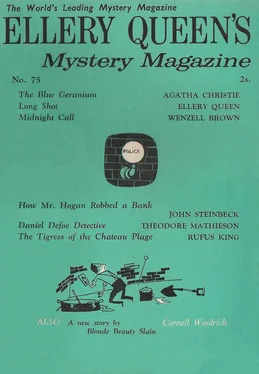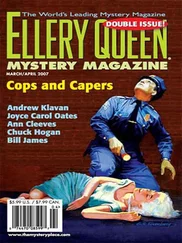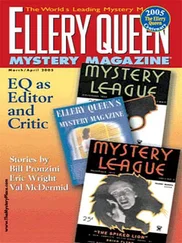Агата Кристи - Ellery Queen’s Mystery Magazine. No. 75, April 1959, British Edition
Здесь есть возможность читать онлайн «Агата Кристи - Ellery Queen’s Mystery Magazine. No. 75, April 1959, British Edition» весь текст электронной книги совершенно бесплатно (целиком полную версию без сокращений). В некоторых случаях можно слушать аудио, скачать через торрент в формате fb2 и присутствует краткое содержание. Город: London, Год выпуска: 1959, Издательство: Mellifont Press, Жанр: Детектив, на английском языке. Описание произведения, (предисловие) а так же отзывы посетителей доступны на портале библиотеки ЛибКат.
- Название:Ellery Queen’s Mystery Magazine. No. 75, April 1959, British Edition
- Автор:
- Издательство:Mellifont Press
- Жанр:
- Год:1959
- Город:London
- ISBN:нет данных
- Рейтинг книги:4 / 5. Голосов: 1
-
Избранное:Добавить в избранное
- Отзывы:
-
Ваша оценка:
- 80
- 1
- 2
- 3
- 4
- 5
Ellery Queen’s Mystery Magazine. No. 75, April 1959, British Edition: краткое содержание, описание и аннотация
Предлагаем к чтению аннотацию, описание, краткое содержание или предисловие (зависит от того, что написал сам автор книги «Ellery Queen’s Mystery Magazine. No. 75, April 1959, British Edition»). Если вы не нашли необходимую информацию о книге — напишите в комментариях, мы постараемся отыскать её.
Ellery Queen’s Mystery Magazine. No. 75, April 1959, British Edition — читать онлайн бесплатно полную книгу (весь текст) целиком
Ниже представлен текст книги, разбитый по страницам. Система сохранения места последней прочитанной страницы, позволяет с удобством читать онлайн бесплатно книгу «Ellery Queen’s Mystery Magazine. No. 75, April 1959, British Edition», без необходимости каждый раз заново искать на чём Вы остановились. Поставьте закладку, и сможете в любой момент перейти на страницу, на которой закончили чтение.
Интервал:
Закладка:
Ellery Queen’s Mystery Magazine. No. 75, April 1959, British Edition
Agatha Christie
The Blue Geranium
From The Tuesday Club Murders, © 1928, 1929, 1939, 1933, by Agatha Christie
Zarida, Reader of the Future, predicted that a blue primrose would mean warning, a blue hollyhock would foretell DANCER, and a blue geranium — DEATH ...
“When I was down here last year—” said Sir Henry Clithering, and stopped.
His hostess, Mrs. Bantry, looked at him curiously.
The Ex-Commissioner of Scotland Yard was staying with old friends of his, Colonel and Mrs. Bantry, who lived near St. Mary Mead.
Mrs. Bantry, pen in hand, had just asked his advice as to who should be invited to make a sixth guest at dinner that evening.
“Yes” said Mrs. Bantry encouragingly. “When you were here last year?”
“Tell me,” said Sir Henry, “do you know a Miss Marple?"
Mrs. Bantry was surprised. It was the last thing she had expected.
“Know Miss Marple? Who doesn’t! The typical old maid of fiction. Quite a dear, but hopelessly behind the times. Do you mean you would like me to ask her to dinner?”
“You are surprised?"
“A little, I must confess. I should hardly have thought you — but perhaps there’s an explanation?”
“The explanation is simple enough. When I was down here last year we got into the habit of discussing unsolved mysteries — there were five or six of us — Raymond West, the novelist, started it. We each supplied a story to which we knew the answer, but nobody else did. It was supposed to be an exercise in the deductive faculties — to see who could get nearest the truth.”
“Well?”
“Like in the old story — we hardly realized that Miss Marple was playing; but we were very polite about it — didn’t want to hurt the old dear’s feelings. And now comes the cream of the jest. The old lady outdid us every time!”
“What?”
“I assure you — straight to the truth like a homing pigeon.”
“But how extraordinary! Why, dear old Miss Marple has hardly ever been out of St. Mary Mead.”
“Ah! But according to her, that has given her unlimited opportunities of observing human nature — under the microscope, as it were.”
“I suppose there’s something in that,” conceded Mrs. Bantry. “One would at least know the petty side of people. But I don’t think we have any really exciting criminals in our midst. I think we must try her with Arthur’s ghost story after dinner. I’d be thankful if she’d find a solution to that.”
“I didn’t know that Arthur believed in ghosts.”
“Oh, he doesn’t. That’s what worries him so. And it happened to a friend of his, George Pritchard — a most prosaic person. It’s really rather tragic for poor George. Either this extraordinary story is true — or else—”
“Or else what?”
Mrs. Bantry did not answer. After a minute or two she said irrelevantly, “You know, I like George — everyone does. One can’t believe that he — but people do such extraordinary things.”
Sir Henry nodded. He knew, better than Mrs. Bantry, the extraordinary things that people did.
So it came about that evening Mrs. Bantry looked around her dinner table (shivering a little as she did so, because of the dining-room, like most English dining-rooms, was extremely cold) and fixed her gaze on the very upright old lady sitting on her husband’s right. Miss Marple wore black lace mittens; an old lace fichu was draped round her shoulders and another piece of lace surmounted her white hair. She was talking animatedly to the elderly doctor, Dr. Lloyd, about the Workhouse and the suspected shortcomings of the District Nurse.
Mrs. Bantry marveled anew. She even wondered whether Sir Henry had been making an elaborate joke — but there seemed no point in that. Incredible that what he had said could really be true.
Her glance went on and rested affectionately on her red-faced broad-shouldered husband as he sat talking horses to Jane Helier, the beautiful and popular actress. Jane, more beautiful (if that were possible) off the stage than on, opened enormous blue eyes and murmured at discreet intervals: “Really?” “Oh fancy!” “How extraordinary!” She knew nothing whatever about horses and cared less.
“Arthur,” said Mrs. Bantry, “you’re boring poor Jane to distraction. Leave horses alone and tell her your ghost story instead. You know... George Pritchard.”
“Eh, Dolly? Oh, but I don’t know—”
“Sir Henry wants to hear it too. I was telling him something about it this morning. It would be interesting to hear what everyone has to say about it.”
“Oh, do!” said Jane. “I love ghost stories.”
“Well—” Colonel Bantry hesitated. “I’ve never believed much in the supernatural. But this—
“I don’t think any of you know George Pritchard. He’s one of the best. His wife — well, she’s dead now, poor woman. I’ll just say this much: she didn’t give George any too easy a time when she was alive. She was one of those semi-invalids — I believe she really had something wrong with her, but whatever it was she played it for all it was worth. She was capricious, exacting, unreasonable. She complained from morning to night. George was expected to wait on her hand and foot, and every thing he did was always wrong and he got cursed for it. Most men, I’m fully convinced, would have hit her over the head with a hatchet long ago. Eh, Dolly, isn’t that so?”
“She was a dreadful woman,” said Mrs. Bantry with conviction. “If George Pritchard had brained her with a hatchet, and there had been any woman on the jury, he would have been triumphantly acquitted.”
“I don’t quite know how this business started. George was rather vague about it. I gather Mrs. Pritchard had always had a weakness for fortune-tellers, palmists, clairvoyantes — anything of that sort. George didn’t mind. If she found amusement in it well and good. But he refused to go into rhapsodies himself, and that was another grievance.
“A succession of hospital nurses was always passing through the house, Mrs. Pritchard usually becoming dissatisfied with them after a few weeks. One young nurse had been very keen on this fortune-telling stunt, and for a time Mrs. Pritchard had been extremely fond of her. Then she suddenly fell out with her and insisted on her going. She had back another nurse who had been with her previously — an older woman, experienced and tactful in dealing with a neurotic patient. Nurse Copling, according to George, was a very good sort — a sensible woman to talk to. She put up with Mrs. Pritchard’s tantrum* and nerve-storms with complete indifference.
“Mrs. Pritchard always lunched upstairs, and it was usual at lunch time for George and the nurse to come to some arrangement for the afternoon. Strictly speaking, the nurse went off from two to four, but ‘to oblige,’ as the phrase goes, she would sometimes take her time off after tea if George wanted to be free for the afternoon. On this occasion she mentioned that she was going to see a sister at Golders Green and might be a little late returning. George’s face fell, for he had arranged to play a round of golf. Nurse Copling, however, reassured him.
“ ‘We’ll neither of us be missed, Mr. Pritchard.’ A twinkle came into her eye. ‘Mrs. Pritchard’s going to have more exciting company than ours.’
“ ‘Who’s that?’
“ ‘Wait a minute,’ Nurse Copling’s eye twinkled more than ever. ‘Let me get it right. Zarida, Psychic Reader of the Future. ’
“ ‘Oh, Lord!’ groaned George. ‘That’s a new one, isn’t it?’
“ ‘Quite new. I believe my predecessor, Nurse Carstairs, sent her along. Mrs. Pritchard hasn’t seen her yet. She made me write, fixing an appointment for this afternoon.’
Читать дальшеИнтервал:
Закладка:
Похожие книги на «Ellery Queen’s Mystery Magazine. No. 75, April 1959, British Edition»
Представляем Вашему вниманию похожие книги на «Ellery Queen’s Mystery Magazine. No. 75, April 1959, British Edition» списком для выбора. Мы отобрали схожую по названию и смыслу литературу в надежде предоставить читателям больше вариантов отыскать новые, интересные, ещё непрочитанные произведения.
Обсуждение, отзывы о книге «Ellery Queen’s Mystery Magazine. No. 75, April 1959, British Edition» и просто собственные мнения читателей. Оставьте ваши комментарии, напишите, что Вы думаете о произведении, его смысле или главных героях. Укажите что конкретно понравилось, а что нет, и почему Вы так считаете.












